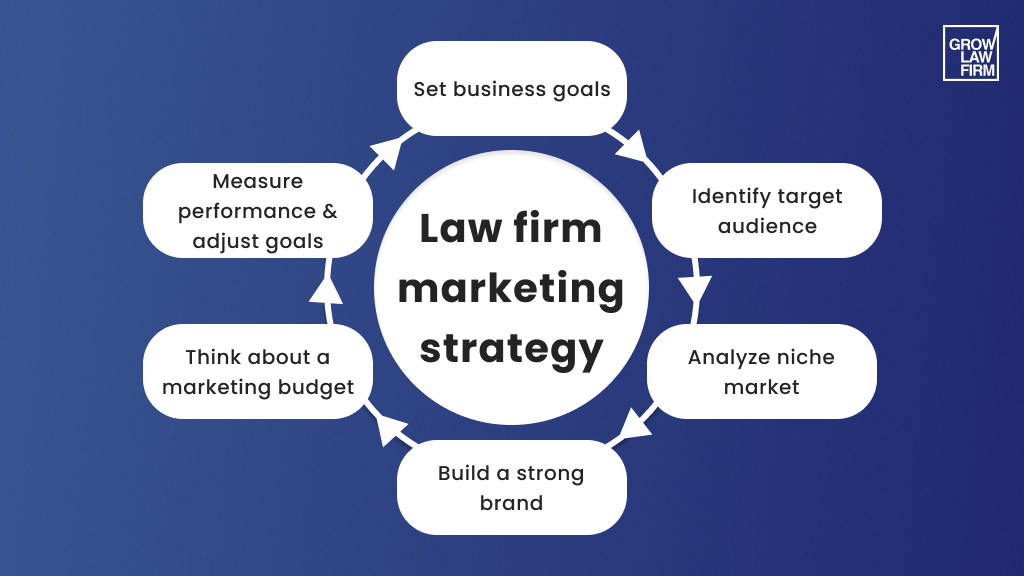In today’s competitive legal landscape, law firms marketing are increasingly turning to digital strategies to reach potential clients. While traditional methods like print advertising still have a place, the shift towards online research and client acquisition has made a strong digital presence essential for survival.
Toc
Understanding the Modern Legal Marketing Landscape

The internet has revolutionized the way we do business, and the legal industry is no exception. With the rise of online search engines and social media platforms, potential clients now have more options than ever before to find and evaluate legal services.
This shift in consumer behavior has forced law firms to adapt their marketing strategies. In order to stay competitive, a strong digital presence is now crucial for attracting new clients and building a reputable brand in the legal community.
The Transformation of Legal Marketing
The legal marketing landscape has undergone a significant transformation in recent years. What was once dominated by traditional methods like print ads and direct mail has given way to an abundance of digital strategies, such as search engine optimization (SEO) and social media campaigns. The rise of online legal research and client acquisition has made it imperative for law firms to establish a strong digital presence. Additionally, the impact of social media and content marketing has prompted legal professionals to rethink their marketing approach.
A 2023 study by the American Bar Association, published in December 2023, found that 90% of potential clients begin their search for legal services online. This shift is driven by the accessibility and convenience of online resources, such as legal directories, online reviews, and legal information websites. For instance, a potential client looking for a divorce attorney in Chicago might first search for “divorce lawyer Chicago” on Google, browse through local listings, read reviews on Avvo, and visit the websites of several law firms before making a decision. While online research plays a significant role, traditional methods like referrals and networking still hold value, especially in niche practice areas or for clients seeking personalized legal advice.
Legal marketers face unique challenges, such as navigating ethical considerations and building trust in a competitive market. Attorneys must adhere to strict rules and regulations regarding advertising, client confidentiality, and the avoidance of misleading claims. Additionally, the legal industry is highly competitive, making it crucial for law firms marketing to differentiate themselves and establish their credibility.
However, the evolving landscape also presents numerous opportunities. By leveraging new technologies and marketing channels, law firms can streamline and personalize their marketing efforts, ultimately driving better results. Innovations in areas like artificial intelligence, machine learning, and data analytics have the potential to revolutionize how law firms approach marketing, enabling them to deliver more targeted and effective campaigns.
Crafting a Winning Law Firm Marketing Strategy

A strong digital presence is critical for law firms looking to remain relevant and competitive in the modern legal landscape. However, simply having a website or social media account is not enough. A comprehensive marketing strategy that combines both traditional and digital tactics is necessary for success.
Building a Solid Foundation
The first step in crafting a winning marketing strategy is to establish a solid foundation. This includes creating a professional and informative website, building an active presence on relevant social media platforms, and optimizing for search engines. A well-designed website that provides valuable content and showcases your firm’s expertise can help build trust with potential clients. Social media platforms like LinkedIn provide opportunities to network, share industry insights, and connect with potential clients.
Focusing on Content Marketing
Content marketing has become a crucial component of modern legal marketing. By creating and sharing valuable, relevant, and consistent content, law firms can establish their thought leadership and attract potential clients. This can include blog articles, infographics, videos, webinars, and other forms of media that showcase the firm’s expertise in a particular practice area or legal issue. Not only does this help with search engine optimization (SEO), but it also provides value to potential clients who are seeking information on a specific topic.
Utilizing Data-Driven Strategies
Data analytics is another valuable tool for law firms looking to optimize their marketing efforts. By analyzing data from website traffic, social media engagement, and email campaigns, firms can gain insights into their target audience’s behaviors and preferences. This information can then be used to tailor marketing strategies and improve overall ROI.
Defining Your Target Audience and Market Analysis
Identifying your ideal client profile and understanding the legal market landscape are crucial first steps in developing an effective marketing strategy for law firms. Conduct thorough market research to pinpoint your target demographics, analyze competitors, and define the unique value proposition of your law firm.
Understanding your target audience is essential for creating marketing messages and content that resonate with potential clients. Consider factors such as their age, income level, geographic location, legal needs, and pain points. This information will help you tailor your marketing approach to better meet their expectations and preferences.
Additionally, analyzing the competitive landscape is crucial. Identify your primary competitors, assess their marketing strategies, and determine how your firm can differentiate itself in the market. This analysis can inform your unique value proposition and guide the development of your marketing plan.
Establishing SMART Marketing Goals
To maximize the impact of your marketing efforts, it’s essential to set clear, measurable, achievable, relevant, and time-bound (SMART) goals. These goals should be aligned with the law firm’s overall business objectives, such as increasing revenue, expanding practice areas, or improving client satisfaction. For example, a goal of increasing website traffic by 20% should be linked to a broader objective of generating more leads and converting them into paying clients.
A law firm specializing in personal injury cases might set a goal of increasing website traffic by 25% to generate more leads and ultimately increase the number of personal injury cases they handle. This goal is aligned with their overall business objective of growing their personal injury practice. While aligning marketing goals with business objectives is crucial, it’s also important to consider the long-term impact of marketing efforts. Some goals, such as building brand awareness, may not have immediate financial returns but can contribute to long-term growth and success.
Selecting the Right Marketing Channels
The legal marketing toolkit is a diverse arsenal of both digital and traditional tactics, each offering unique advantages and challenges. Explore the pros and cons of channels like SEO, pay-per-click (PPC) advertising, social media marketing, content marketing, email marketing, referrals, networking, and print advertising. Select the channels that best align with your target audience, budget, and firm size.
When evaluating marketing channels, consider factors such as your firm’s resources, the effectiveness of each channel in reaching your target audience, and the potential return on investment. A balanced, multi-channel approach that combines both online and offline tactics is often the most effective strategy for law firms marketing.
Implementing Essential Law Firm Marketing Tactics

Optimizing for Search Engine Visibility
Ensuring your law firm’s website is optimized for search engines is crucial in today’s digital landscape. Focus on both on-page optimization (keywords, content, website structure) and off-page optimization (link building, directory listings, social media). Develop a comprehensive local SEO strategy to target geographically relevant clients.
While SEO is crucial, it’s important to remember that search engine algorithms are constantly evolving. A focus solely on keyword optimization might not be sufficient to achieve long-term success. Law firms should also prioritize creating high-quality, engaging content that provides value to their target audience. By implementing effective SEO practices, you can improve your firm’s visibility in search engine results, making it more likely for potential clients to find and engage with your services. This can lead to increased website traffic, higher-quality leads, and ultimately, more clients.
Leveraging Pay-Per-Click Advertising
PPC advertising, such as Google Ads and Bing Ads, can be an effective way to drive targeted traffic and generate leads for your law firm. Leverage the targeting capabilities of these platforms to reach your ideal clients, and create compelling ad copy and landing pages to convert visitors.
While PPC advertising can be an effective way to drive traffic, it can also be expensive. Law firms should carefully consider their budget and target audience before investing in PPC campaigns. Additionally, they should track their ROI closely to ensure that their campaigns are delivering a positive return. PPC campaigns allow you to quickly reach and engage with your target audience, complementing your organic SEO efforts. By carefully managing your ad budget and continuously optimizing your campaigns, you can achieve a favorable return on investment.
Establishing a Content Marketing Strategy
Position your law firm as an authority in your practice area by creating valuable, engaging content. This can include blog posts, articles, videos, infographics, and podcasts. Develop a content distribution strategy to maximize reach and visibility across various online channels.
Effective content marketing not only helps to establish your firm’s expertise but also aids in attracting and nurturing potential clients. By providing informative and relevant content, you can build trust and credibility with your audience, positioning your firm as the go-to resource for legal solutions.
Embracing Social Media Marketing
Establishing a strong social media presence can help you build relationships, engage with clients, and promote your firm’s expertise. Tailor your content and strategies to platforms like LinkedIn, Facebook, Twitter, and Instagram to reach your target audience.
Social media marketing provides a dynamic platform to showcase your firm’s brand personality, values, and expertise, allowing you to connect with potential clients on a more personal level. By leveraging the unique features and capabilities of each platform, you can create a cohesive and impactful social media presence that supports your overall marketing efforts.
Leveraging Email Marketing
Email marketing is a powerful tool for nurturing leads, strengthening client relationships, and driving conversions. Build an email list, segment your subscribers, and create targeted, personalized email campaigns to achieve your marketing goals.
Email marketing enables you to stay in touch with your audience, provide valuable updates and insights, and encourage further engagement with your firm. By crafting compelling email content and leveraging automation, you can effectively nurture leads and maintain strong relationships with your clients.
Measuring and Optimizing Law Firm Marketing Efforts

Effective marketing is not a one-time effort but an ongoing process. It’s important to regularly track and analyze the performance of your marketing efforts to identify what’s working and where you can improve. This includes monitoring website traffic, leads, conversions, social media engagement, email open rates, and other relevant metrics.
Tracking Key Performance Indicators (KPIs)
To gauge the success of your marketing initiatives, track key metrics such as website traffic, leads generated, conversion rates, return on investment, and brand awareness. Leverage analytics tools like Google Analytics and Clio Grow to gather and analyze data.
Regularly monitoring your marketing KPIs allows you to identify which tactics are performing well and where you can make improvements. This data-driven approach enables you to make informed decisions and optimize your marketing strategies for maximum impact.
Embracing Data-Driven Optimization
Use the insights gained from your marketing data to identify areas for improvement and make informed decisions. Implement A/B testing, analyze trends, and continuously refine your strategies to maximize the impact of your law firm’s marketing efforts.
By adopting a data-driven mindset, you can continually enhance your marketing approach, ensuring that your efforts are aligned with the evolving needs and preferences of your target audience. This iterative process of testing, analyzing, and optimizing will help you achieve sustainable growth and success for your law firm.
The Future of Law Firm Marketing
As technology and digital platforms continue to evolve, law firms must stay agile and adaptable in their marketing strategies. Embracing emerging trends such as voice search, artificial intelligence, and virtual events can help law firms reach and engage with clients in new ways.
Exploring Emerging Trends and Technologies
The legal marketing landscape is rapidly evolving, with emerging technologies like artificial intelligence, machine learning, and predictive analytics poised to transform the industry. According to a 2023 study by the Legal Marketing Association, 60% of law firms are currently using AI-powered tools for marketing purposes. Explore the impact of these innovations on aspects such as marketing automation, personalization, and data-driven decision-making.
As these technologies continue to advance, law firms that embrace them will gain a competitive edge. By leveraging AI-powered tools for tasks like lead generation, content creation, and campaign optimization, firms can streamline their marketing efforts and deliver more personalized experiences to their clients.
Embracing Adaptability and Innovation
To stay ahead of the curve, legal marketing professionals must embrace a mindset of adaptability and innovation. Continuously learn about new trends, experiment with novel strategies, and stay informed about the latest developments in the legal marketing industry. By doing so, you’ll position your law firm for long-term success in the ever-changing digital landscape.
The legal industry is known for its traditional approaches, but the most successful firms are those that are willing to adapt and innovate. By staying curious, embracing new technologies, and continuously refining their marketing strategies, law firms can effectively navigate the evolving landscape and capitalize on emerging opportunities.
Conclusion
Effective law firm marketing is an ongoing process that requires continuous learning, adaptation, and innovation. By embracing the strategies, tactics, and tools discussed in this guide, legal marketing professionals can position their firms for success in the modern legal market. Stay informed about the latest trends, experiment with new approaches, and use data to optimize your efforts. The future of law firm marketing is bright for those who are willing to evolve and stay ahead of the curve.








